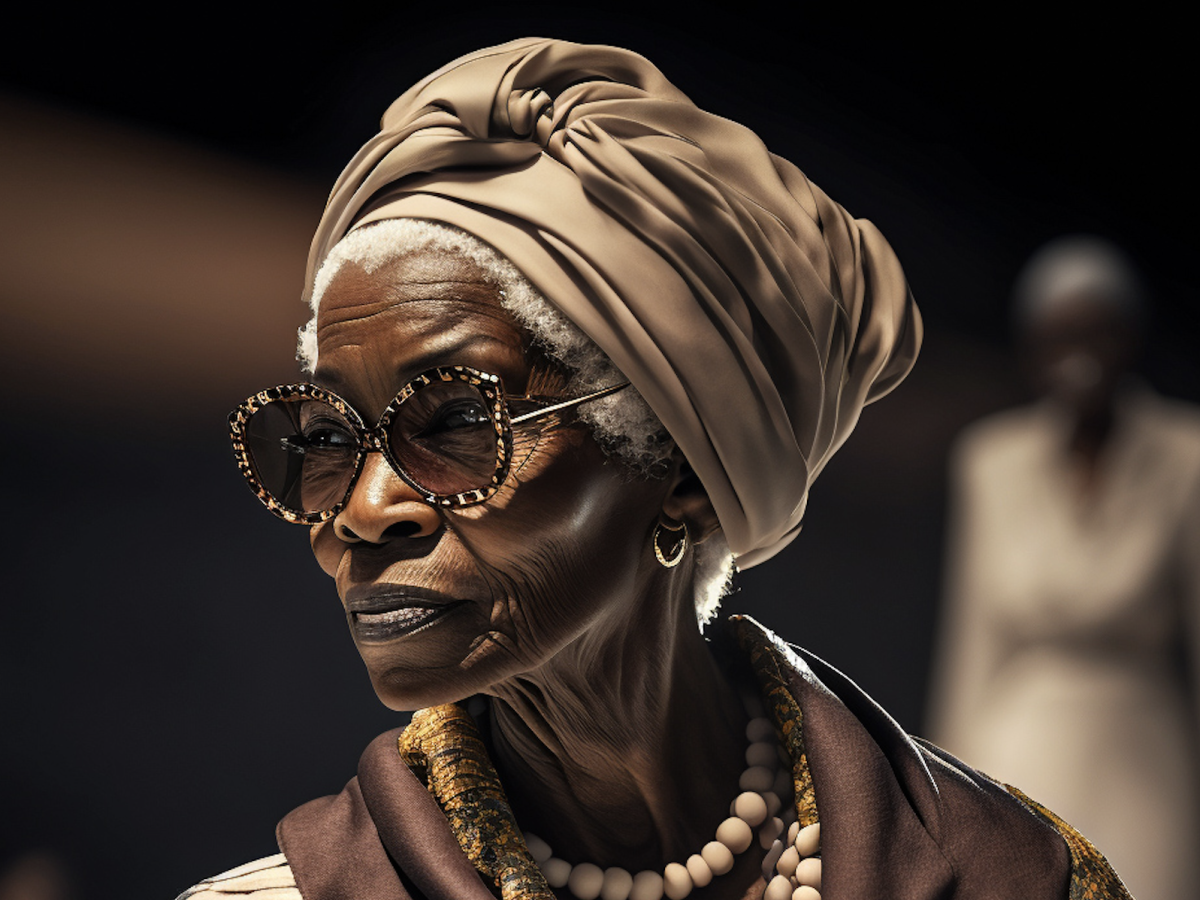
Last month, Malik Afegbua staged his first runway show—a Fashion Show for Elders. Cast with classic men and elegant old-fashioned women, the showcase broke every ordinance in the fashion rulebook. Afegbua’s senior models strutted the catwalk in the tones of nature.
Some wore stylishly folded gele headdress, and others donned overlapping garments layered to perfection. With the dignified air of senior statesmen, the models brought a range of contemporary flair and vintage nobility that is distinctly Nigerian.
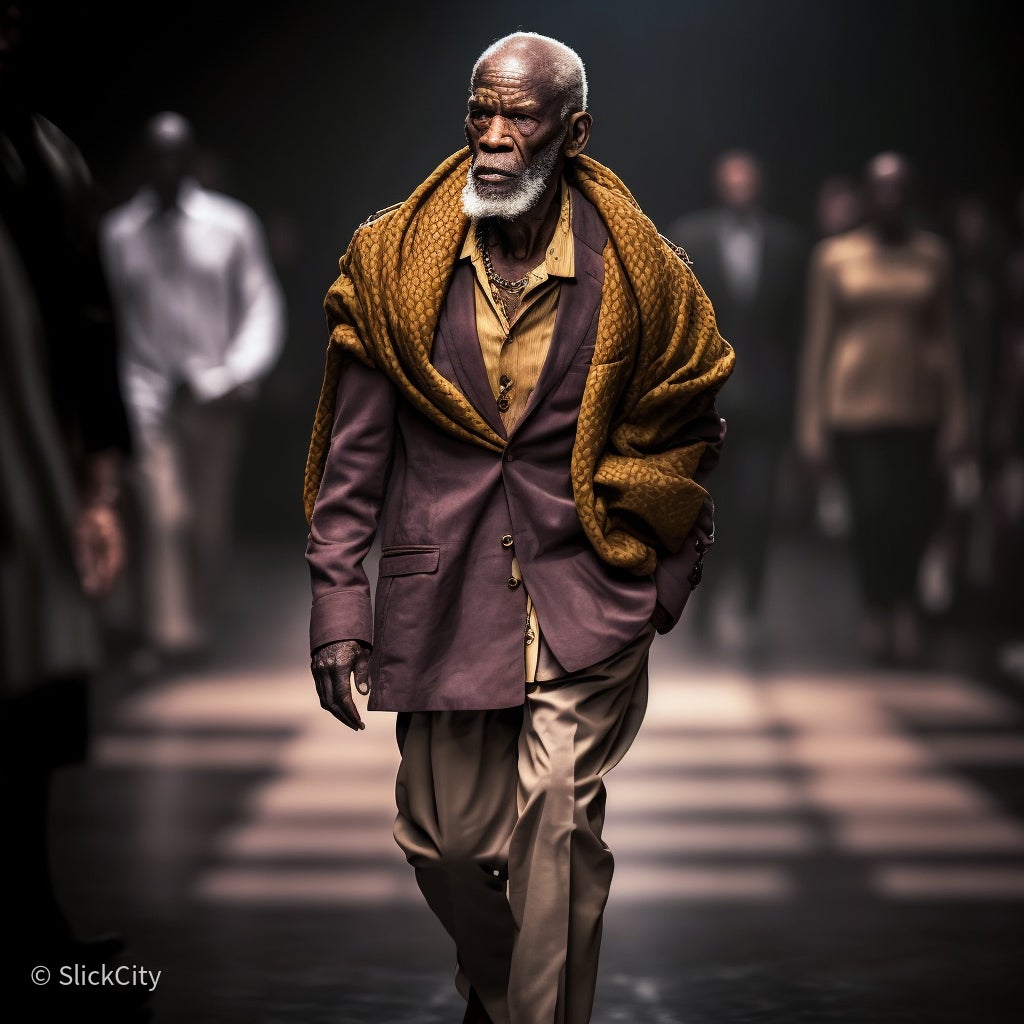
Afegbua’s groundbreaking runway extravaganza met widespread acclaim. For his models, revered for their regal presentation, it was virtually impossible to convince them that their experience wasn’t real. But it wasn’t—and neither were they. The world is not real. The characters are not real. It’s all aspirational,” Afegbua told ESSENCE.
The models, the fashions—the entire Fashion Show for Elders were figments of the artist’s imagination—or, more accurately, a manifestation of his creativity brought to life through artificial intelligence.
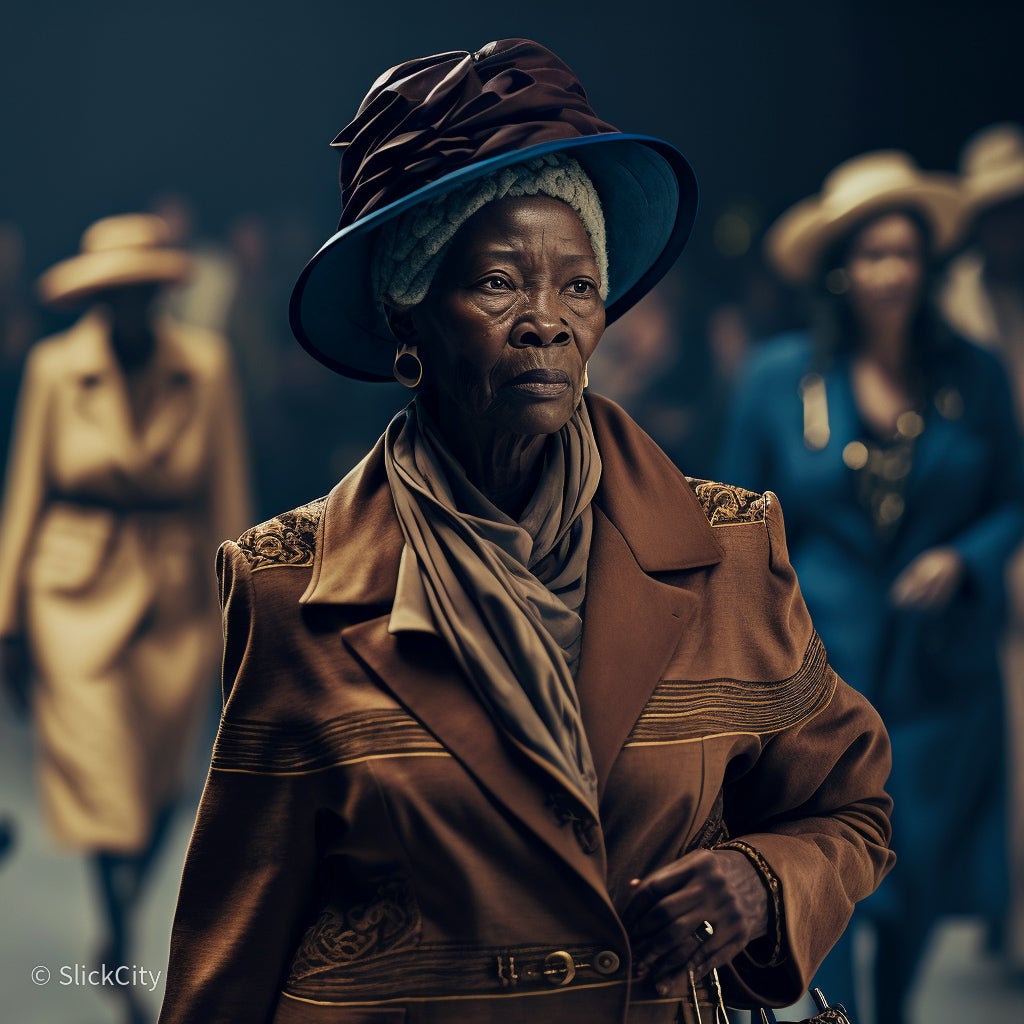
Exploring the bounds of digital art is one of Afegbua’s many creative passions, but his day job as a filmmaker commands much of his focus. Under his production company, Slickcity Media, the Nigerian-born director produces commercials, films, and documentaries.
Currently, he’s working on a Netflix docudrama about Nigerian textile designer and global fashion icon, Nike Davies-Okundaye. The biopic is slated to come out this year. He also directed and co-produced seasons two and three of Made By Design, Netflix’s documentary series highlighting African creative talent.
I caught up with the multimedia creative on a video call from his home in Lagos. He shared his thoughts about the influence of technology on the future of art, the surreal experience of going instantly viral, and the heart-wrenching inspiration behind his Fashion Show for Elders.
On Artificial Intelligence and the future of art.
The concept of AI has come a long way since its early introduction into the cultural zeitgeist. The archetype of an artificially intelligent robot was first presented to the masses in the 1939 film, “The Wizard of Oz.” The depiction of the “Tin man”— a man-like machine lacking a heart but personifying human traits, introduced the notion. As AI technology evolved, so has its uses.
Afegbua’s Fashion Show for Elders barely scratches the surface of his artistic ambitions for AI. “I’m a writer, and so is my wife, Ese. She writes films and screenplays. And the films we write aren’t the kind of things we can afford to produce. We would need a big studio, staff, all sorts of overhead. One day we’ll get there, but what I’ve found is that we can create so much using technology.”
Artists across mediums have differing views on the marriage of tech and art. Some have vocalized concerns about what AI means for the future of artists. Just as some say the popularization of music videos killed the radio star, many believe machine-generated images will kill the artist. Afegbua doesn’t share that concern.. Instead, he embraces AI as a means of enhancing human creativity.
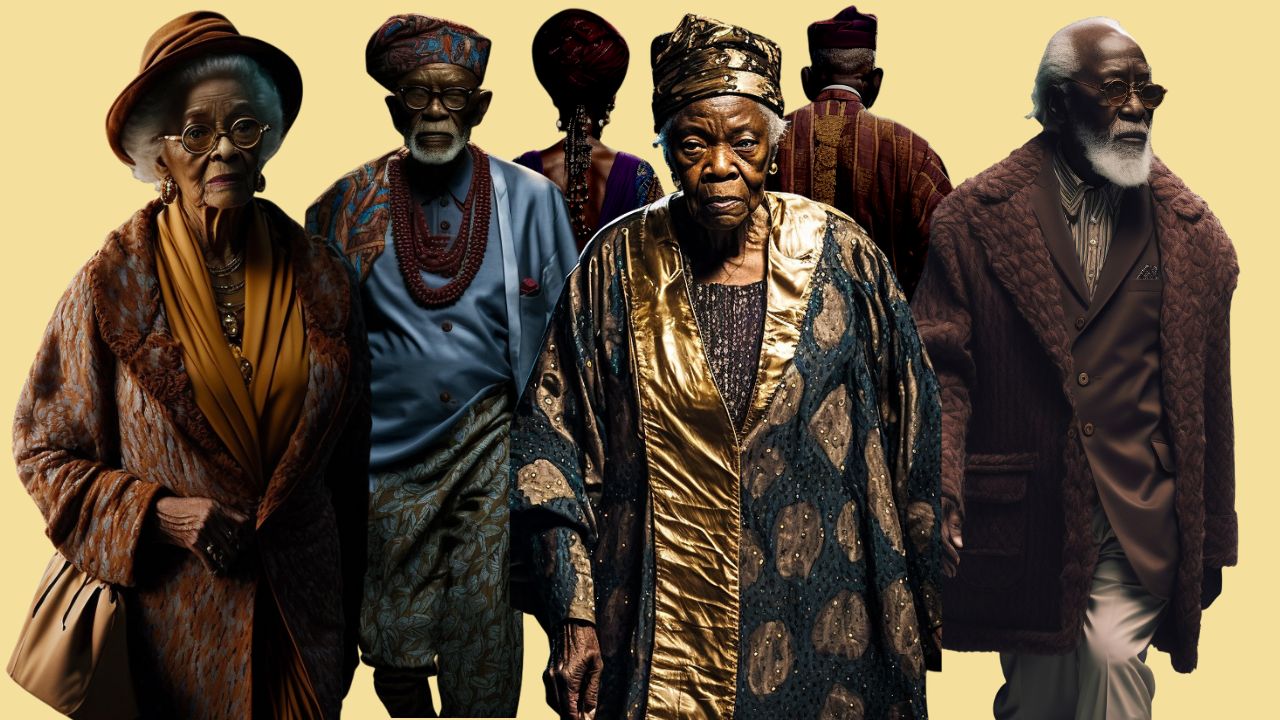
If the remarkably life-like models featured in his virtual fashion show are any indication of what’s possible in art through AI, artist and consumers alike had better embrace the inevitable.
When the elders broke the internet.
It took mere minutes for Afegbua’s virtual runway show to go viral on social media. The instant response took him by surprise, “ I honestly wasn’t expecting it. I expected maybe 20 comments and a few reposts from friends.” What he got far surpassed that. “My phone just didn’t stop buzzing. It got reposted everywhere. The Shade Room shared it, everyone was tagging me all over the timeline,” he said.
Within an hour of posting his richly melanated AI-generated models, Afegbua’s DM’s and email was flooded with interview requests from social media blog sites, television networks, and reporters (present company included) from around the world.
Before posting his Fashion Show for Elders, Afegbua had 3,000 Instagram followers, today he has over 35,000.
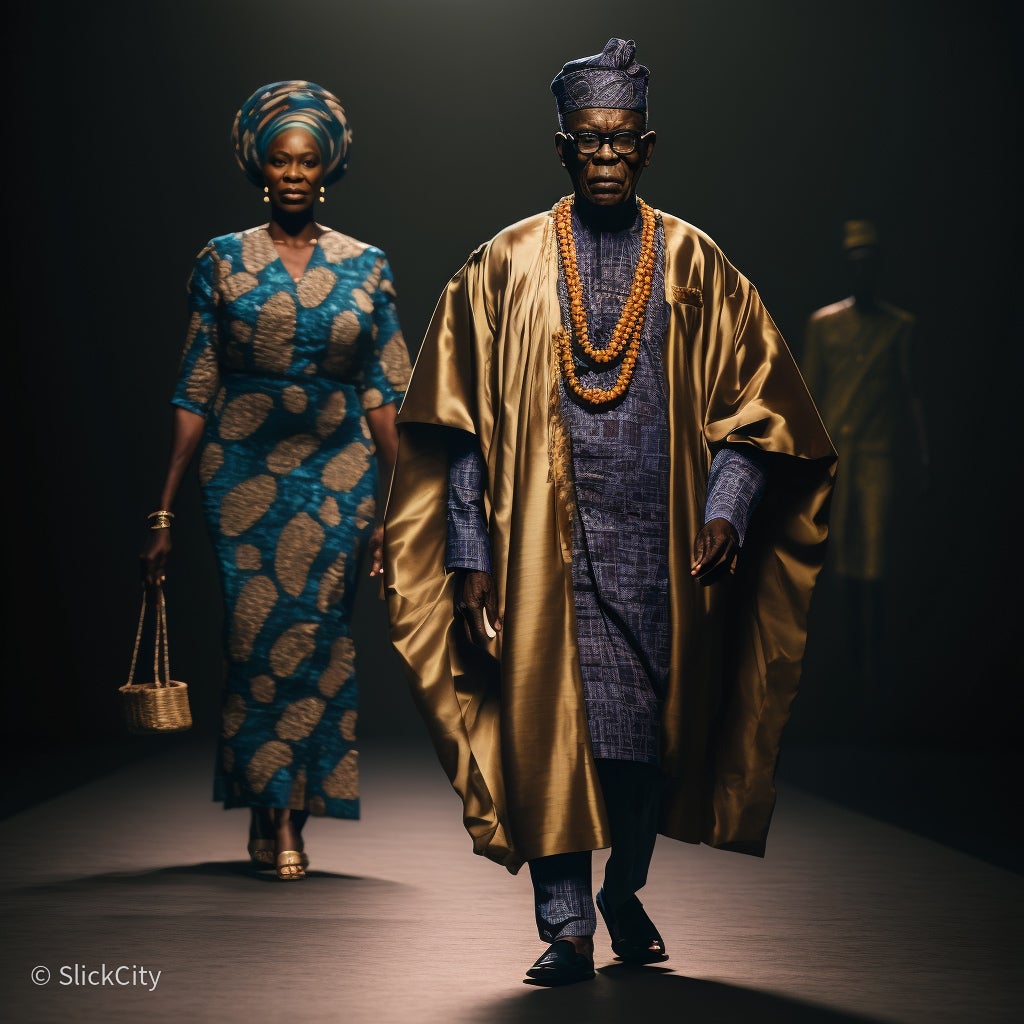
“I got these very emotional messages from a lot of people all over the world, saying how it touched them. I got messages from elderly people who’d lost spouses and friends, and young ones that missed their grandparents. I’ve had people send me prayers, I’ve had thousands of thank you’s. Thousands,” he said.
None of us could have guessed that the dignified seniors, who stirred our collective sense of pride, were inspired by heartache. Likewise, we could not have predicted that the virtual exhibition was the necessary catharsis for a creative in crisis.
Blown away by the warm reception, Afegbua had to sit with it for a while to grasp the impact. “It was actually very overwhelming,” he said. “But, I get it now. This project was personal for me. I think people related to that. It connected with a lot of people who are going through a lot of things, just as I was when I created it. So maybe it actually is a universal thing,” Afegbua said.
Art and Catharsis: Inspiration in unlikely situations.
Afegbua speaks with his mother, Elizabeth, every single day. The two have the kind of connection that seeks each other for advice and finds fascination in the retelling of daily monotony. “With my mom, it’s deep,” he said. “I’m 38 now. I think about all the conversations we’ve had, all the lessons she’s shared.”
One of six children, Afegbua says his siblings are equally close to the family matriarch. It’s a privilege she has earned. “My dad, before he retired, was a pilot, so he was always coming from some country and traveling to another. That meant we had our mom most of the time. She was proper hands-on with every single one of us,” he said.
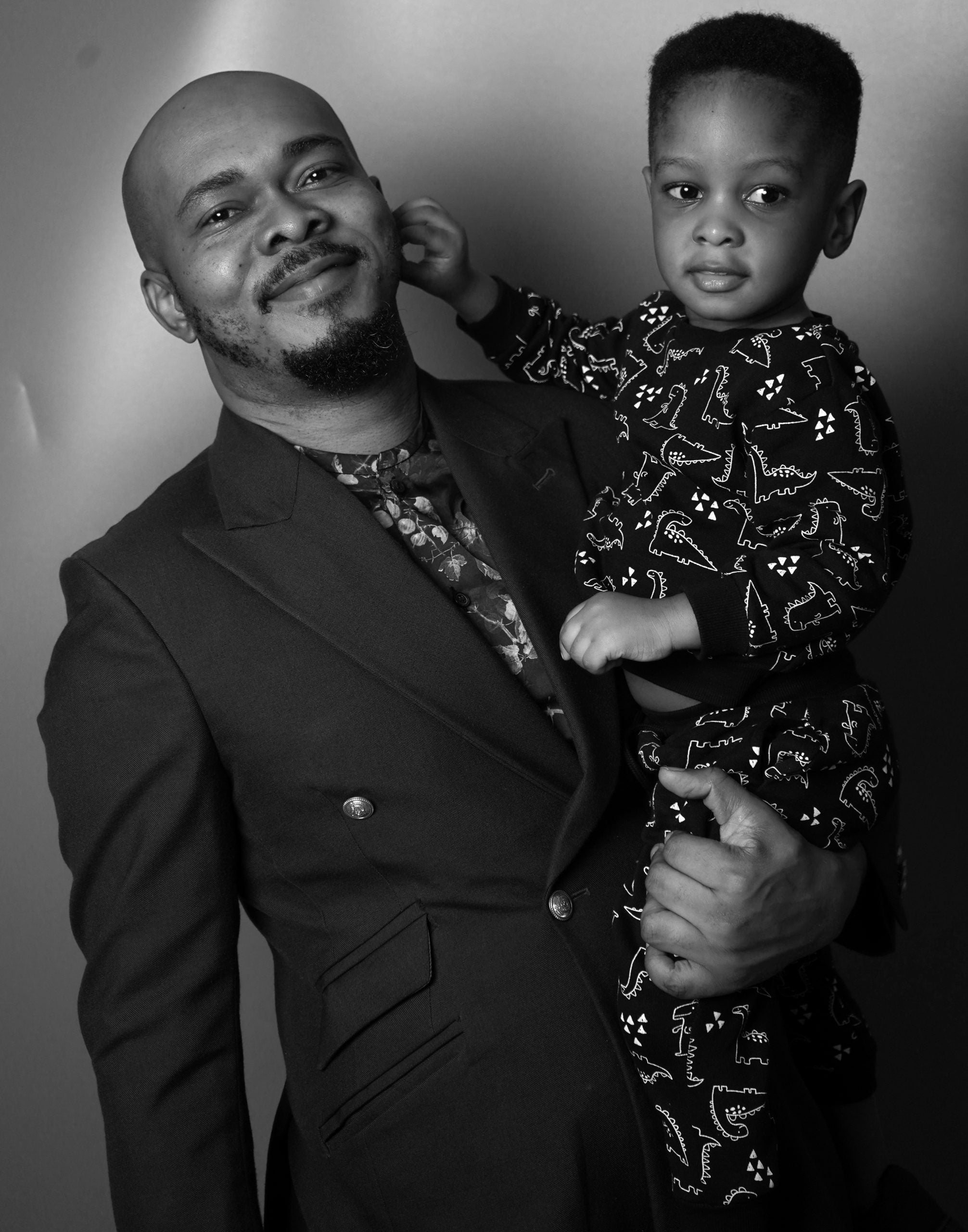
Now, himself a husband and father, Afegbua came face-to-face recently with one of his greatest fears.
Early last year, the bond between him and his mother was nearly cut short when after deboarding a 12-hour flight from Nigeria to Atlanta, she suffered a debilitating stroke on the jetway at Hartsfield airport. She had multiple strokes. It was devastating,” he said.
The instant and unexpected nature of the situation made it especially difficult for the family to process. Fortunately, Elizabeth’s condition began to improve. “She was on life support for a while, but she just kept getting better,” Afegbua said. “God works in mysterious ways. We prayed every day as a family. We are all so close to our mom, every single one of us, equally close.”
The road to recovery has been challenging and ongoing, but Afegbua is infinitely grateful to still have his mother. However, the experience of nearly losing her, he said, altered something within him.
“I couldn’t speak to her for a long while. We couldn’t communicate because of all the complications from the stroke. So many months passed. I was thinking about her in many ways—all of our happy memories, our conversations. We share everything,” he said.
“A lot of things happened in my life that I couldn’t share with her during that time. And it put me in a weird spot.” Faced with an existential crisis, Afegbua turned to his art for comfort.
“Creating is like therapy for me. It helps me to destress and relax. I also use it to help me process what I feel,” he shared. What he felt in the moment was a sobering realization of the fragile nature of life, and an appreciation for old age as a blessing, not to be taken for granted.
He thought about his mother, now dependent on healthcare professionals and family to care for her basic needs. He considered all the adult children in his position. He thought about how society discards its senior citizens. “I feel like they (senior people) are marginalized in society when they get to the age or reach a place where they can no longer care for themselves or engage like they used to. It’s like, we just put them somewhere to wait to die,” he said.
In that moment of inspiration, the artist found his muse.
“I wanted to create something that would change our perception (of seniors). Black elders, especially, have seen so much oppression in their lives, so much being put down,” he said. “What if I could portray them as Kings and Queens? What if I showed their confidence and strength?”
The Fashion Show for Elders was conceived.
Afegbua gave his seniors command of the stage. He carefully adorned their faces with wisdom and cloaked them in the finest of fabrics. Standing tall and proud like the royalty they are, he placed our elders in the spotlight and allowed them to shine.
Mission accomplished.